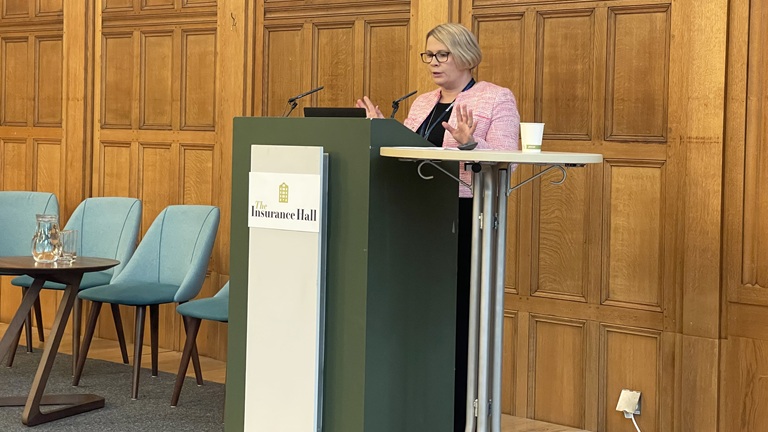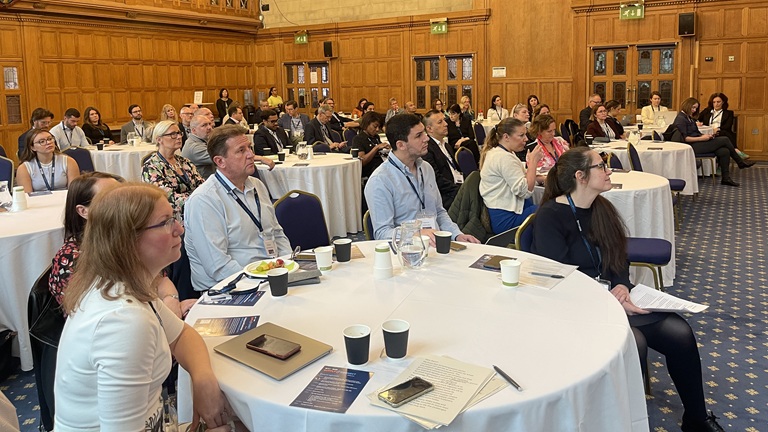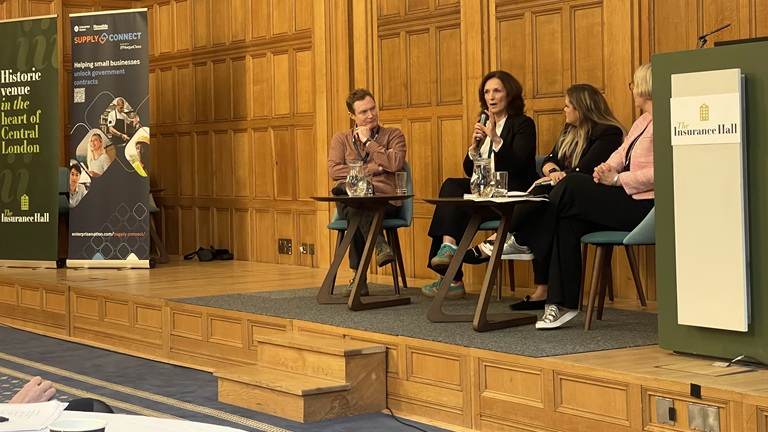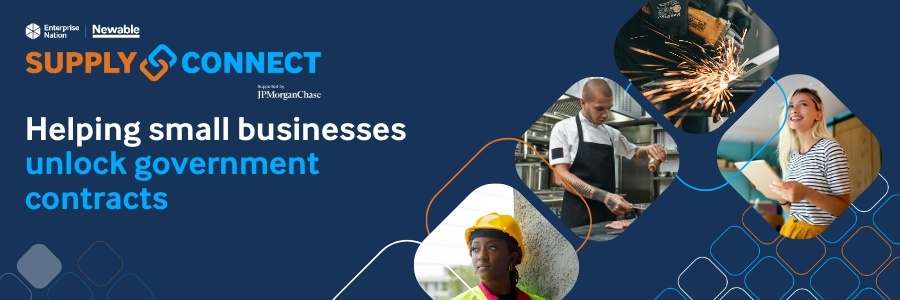Supply Connect: A simpler path for SMEs to sell to government
)
Posted: Wed 8th Oct 2025
This week, Enterprise Nation launched Supply Connect, a two-year national pilot designed to transform how small businesses access public sector supply chains.
Backed by JPMorganChase and delivered with Newable, the programme responds directly to the new Procurement Act by helping large organisations buy from SMEs more easily.
Enterprise Nation and partners held an event on 7 October to launch the programme to the public. Here's a quick summary of what happened on the day.
Opening remarks
The programme's director, Maggie Berry OBE, opened the session by outlining the vision for Supply Connect – to make it simpler for large buyers to discover, assess and onboard small firms.
Running until March 2027, the programme is designed to bridge the gap between supply-ready SMEs and the organisations delivering public sector contracts.
At its core is the SME Supplier Hub, a new digital platform combining guidance, live tender data and tailored support through e-learning, one-to-one advice and "meet the buyer" events.
It also supports procurement professionals through the SME Supply Chain Forum, a network promoting best practice and inclusive supply chains.
As Maggie explained, the ambition is simple but powerful: to help small firms win more contracts, grow sustainably and drive wider economic growth.

Insights from the new Supply Connect report
Maggie shared early findings from the programme's new insight report.
Public agencies account for about a third of all government spending and a tenth of the economy, controlling a £300 billion procurement pot.
The Procurement Act allows this spending to consider community impact and sustainability, not just price.
Yet while SMEs make up 99% of UK businesses and employ 16 million people, only 20% of direct government procurement went to SMEs in 2023.
The report's survey of 200 small firms found that:
51% want to supply government but lack the capacity to do so
40% need support to become supplier-ready
23% have never heard of supplier-readiness training
These findings have shaped how the programme will work. The Supplier Hub is designed to make discovery easier and offer tiered support to build readiness, while the Supply Chain Forum will share learning among buyers.
The data echoes broader evidence from the launch, that procurement systems are still written in impenetrable language, geared to large contracts and often rely on applications rather than relationships.
The funder's view: Unlocking inclusive growth
Stephanie Mestrallet, executive director at JPMorganChase, outlined the bank's £40 million commitment to inclusive economic growth across the UK, with a focus on small businesses, young people and families.
She described SMEs as "the backbone of the economy" and said Supply Connect will help them overcome barriers to accessing both public and private supply chains.
Through Supply Connect, SMEs will receive tailored procurement guidance, connect with major buyers and gain exposure through sector-focused activities in food and drink, facilities management and construction.
The aim is to strengthen small business participation across both public and private supplier networks.

Fireside conversation: Lessons from the frontline
In conversation with Maggie Berry OBE, Gill Thorpe, CEO of The Sourcing Team, reflected on her company's shift from global sourcing to getting 80% of its materials from the UK and Europe, with 91% of those materials being recycled or recyclable. COVID-19 and rising ethical standards, she said, had accelerated the change.
Gill discussed her experience of government procurement, from supplying campaigns such as Change4Life (now Healthier Families) to navigating the closure of the Central Office of Information, which forced many SMEs to adapt overnight.
Visibility, she noted, remains a major challenge:
"It's not enough to be brilliant at what you do. If buyers can't find you, you won't make the shortlist."
Many tenders, she added, are still unclear, short-term and low-value, with selection criteria focused too heavily on price.
By contrast, corporate procurement often offers longer-term, more collaborative partnerships. Her firm has worked with one FMCG client for 18 years and built lasting relationships through supplier-diversity programmes such as those run by Accenture.
Gill's advice to SMEs was clear:
Be tender-ready: Keep certifications and documents up to date.
Know your fit: Focus on the right tenders, rather than trying to win every opportunity.
Build credibility: Use accreditations, volunteering and strong case studies to stand out.
Network constantly: Attend "meet the buyer" events and build relationships.
Her call to action for policymakers was clear: create a central hub where SMEs can showcase their capabilities, update their details and connect directly with buyers – a vision now being realised through Supply Connect.
Audience Q&A: Practical challenges and opportunities
During the Q&A, Maggie Berry OBE confirmed the programme's focus on micro and small firms, which make up most of the SME population.
One-to-one advice and national "meet the buyer" events will make sure support reaches businesses across the UK. On bid readiness, she highlighted online resources, tailored advice and hybrid training.
Addressing concerns on information security, Gill Thorpe said many small firms still lack Cyber Essentials certification. She urged that accreditation support form part of the programme, especially for tier-two and tier-three suppliers.

Panel discussion: Rethinking supply chain engagement
A closing panel chaired by Maggie Berry OBE brought together Bekki Peters (Sodexo), Caron Dunlop (Mott MacDonald) and Gus Tugendhat (Tussell) to explore how the Procurement Act is changing relationships between buyers and suppliers.
SMEs continue to face barriers – complex onboarding, costly accreditations and slow or inconsistent payment terms. Both Sodexo and Mott MacDonald are simplifying their processes, introducing equivalency principles instead of rigid ISO rules and tailoring requirements by category.
There was consensus that standardising onboarding across major suppliers could cut duplication and costs. The Act itself was described as a catalyst for cultural change, promoting transparency and social value and building a far more diverse and local pool of suppliers.
Both organisations reaffirmed their commitments to supplier diversity, supporting veteran-, women- and locally owned SMEs through data-driven initiatives.
Gus Tugendhat highlighted how platforms like Tussell and Supply Connect improve visibility and data access for small businesses.
The panel agreed three priorities for progress:
Collaboration: Large suppliers, SMEs and government must share best practice.
Proof of concept: Pilot projects build trust and demonstrate SMEs' capabilities.
Visibility: Data-driven platforms can level the playing field.
The panel closed with some practical action points:
Connecting SMEs to category managers
Boosting visibility for veteran-owned businesses
Keeping feedback loops open as the pilot evolves
Looking ahead
Supply Connect marks a concrete step toward a more open, transparent and inclusive procurement landscape.
For small businesses, it offers a practical route to build capability, gain visibility and win contracts. For large organisations, it's a chance to diversify and strengthen their supplier base.
As Maggie Berry OBE summed up: "Make it easier for SMEs to be seen, selected and succeed."
Take your next step
Public sector contracts aren't just for the big players. With the government actively encouraging SMEs to take part, your business could be exactly what buyers are looking for. Register now
Get business support right to your inbox
Subscribe to our newsletter to receive business tips, learn about new funding programmes, join upcoming events, take e-learning courses, and more.
Start your business journey today
Take the first step to successfully starting and growing your business.
Join for free

